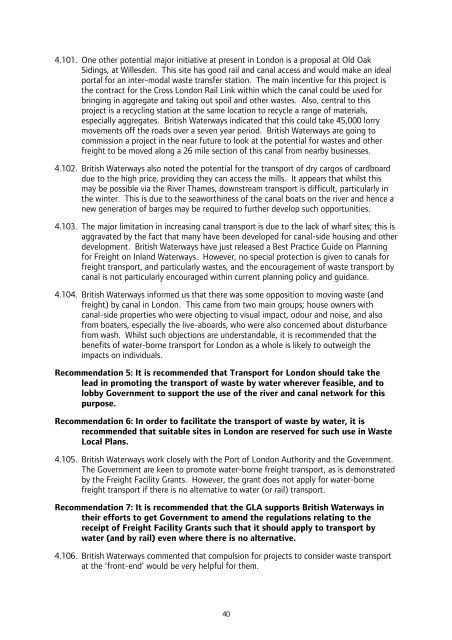London Wider Waste Strategy - London - Greater London Authority
London Wider Waste Strategy - London - Greater London Authority
London Wider Waste Strategy - London - Greater London Authority
You also want an ePaper? Increase the reach of your titles
YUMPU automatically turns print PDFs into web optimized ePapers that Google loves.
4.101. One other potential major initiative at present in <strong>London</strong> is a proposal at Old Oak<br />
Sidings, at Willesden. This site has good rail and canal access and would make an ideal<br />
portal for an inter-modal waste transfer station. The main incentive for this project is<br />
the contract for the Cross <strong>London</strong> Rail Link within which the canal could be used for<br />
bringing in aggregate and taking out spoil and other wastes. Also, central to this<br />
project is a recycling station at the same location to recycle a range of materials,<br />
especially aggregates. British Waterways indicated that this could take 45,000 lorry<br />
movements off the roads over a seven year period. British Waterways are going to<br />
commission a project in the near future to look at the potential for wastes and other<br />
freight to be moved along a 26 mile section of this canal from nearby businesses.<br />
4.102. British Waterways also noted the potential for the transport of dry cargos of cardboard<br />
due to the high price, providing they can access the mills. It appears that whilst this<br />
may be possible via the River Thames, downstream transport is difficult, particularly in<br />
the winter. This is due to the seaworthiness of the canal boats on the river and hence a<br />
new generation of barges may be required to further develop such opportunities.<br />
4.103. The major limitation in increasing canal transport is due to the lack of wharf sites; this is<br />
aggravated by the fact that many have been developed for canal-side housing and other<br />
development. British Waterways have just released a Best Practice Guide on Planning<br />
for Freight on Inland Waterways. However, no special protection is given to canals for<br />
freight transport, and particularly wastes, and the encouragement of waste transport by<br />
canal is not particularly encouraged within current planning policy and guidance.<br />
4.104. British Waterways informed us that there was some opposition to moving waste (and<br />
freight) by canal in <strong>London</strong>. This came from two main groups; house owners with<br />
canal-side properties who were objecting to visual impact, odour and noise, and also<br />
from boaters, especially the live-aboards, who were also concerned about disturbance<br />
from wash. Whilst such objections are understandable, it is recommended that the<br />
benefits of water-borne transport for <strong>London</strong> as a whole is likely to outweigh the<br />
impacts on individuals.<br />
Recommendation 5: It is recommended that Transport for <strong>London</strong> should take the<br />
lead in promoting the transport of waste by water wherever feasible, and to<br />
lobby Government to support the use of the river and canal network for this<br />
purpose.<br />
Recommendation 6: In order to facilitate the transport of waste by water, it is<br />
recommended that suitable sites in <strong>London</strong> are reserved for such use in <strong>Waste</strong><br />
Local Plans.<br />
4.105. British Waterways work closely with the Port of <strong>London</strong> <strong>Authority</strong> and the Government.<br />
The Government are keen to promote water-borne freight transport, as is demonstrated<br />
by the Freight Facility Grants. However, the grant does not apply for water-borne<br />
freight transport if there is no alternative to water (or rail) transport.<br />
Recommendation 7: It is recommended that the GLA supports British Waterways in<br />
their efforts to get Government to amend the regulations relating to the<br />
receipt of Freight Facility Grants such that it should apply to transport by<br />
water (and by rail) even where there is no alternative.<br />
4.106. British Waterways commented that compulsion for projects to consider waste transport<br />
at the ’front-end’ would be very helpful for them.<br />
40
















